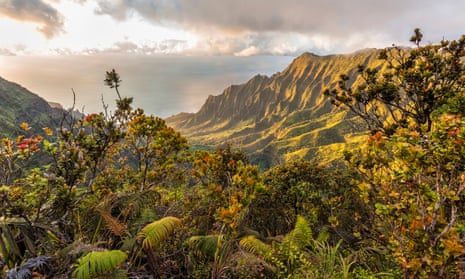Joanne Harris, author
Hawaii
Eight years ago, as a birthday present, I took my daughter to Kauai, one of the Hawaiian islands. Greener and less-populated than the larger islands, the “Garden Island” is a paradise of rivers, dense forests and waterfalls, bracketed by stretches of mostly deserted, sandy beach.
It was idyllic in every way, but one episode stands out in my mind. We had set off on a walk through the forest, having been dropped off by a guide in a canoe, and somehow strayed off the path. For a while, we didn’t notice; it was nice to be alone. We pushed through masses of tall reeds, remembering scenes from movies. We climbed through the roots of banyan trees. And then, suddenly, we were lost. Absolutely, hopelessly lost; miles, it seemed, from anywhere. At first it was almost funny. We tried several directions. All ended in impenetrable thickets.
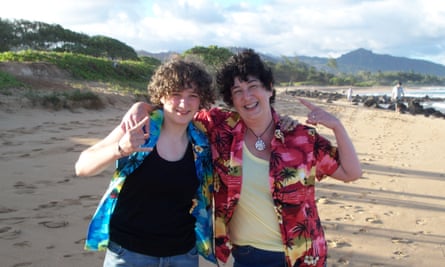
Hours later, I was feeling anxious. There was no mobile reception: no one knew where we were. We tried another direction, and after struggling though what seemed like acres of reeds came across a scene straight out of King Solomon’s Mines – a semicircular clearing that ended in a massive canopy of purple flowers cascading down a tall cliff. It was breathtaking. In spite of our predicament, we felt uniquely privileged – this was a view that belonged to us alone, a place where no tourist had ever set foot. This, to me, is the heart of romance: a sense of connection with place and time, a window into a story.
Joanne Harris’s latest novel is A Pocket Full of Crows (Gollancz, £12.99)
Andrew McCarthy, actor, travel writer, television director
Mozambique
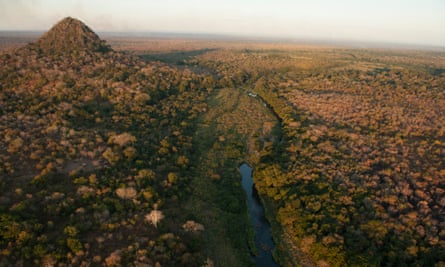
There were no animals. Which, granted, is problematic for an African safari. But Mozambique had suffered through decades of civil war and all the animals in Gorongosa national park – I’m talking about the big ones: elephants, giraffes, lions, even buffalo – had been slaughtered. I suppose that was the reason there were so few visitors.
Then there was the pre-dawn flat tyre that caused us to miss our flight from Beira (the country’s third largest city). There was not another for several days. We amused ourselves for an afternoon watching children do back-flips off discarded truck tyres on the jellyfish-riddled beach.
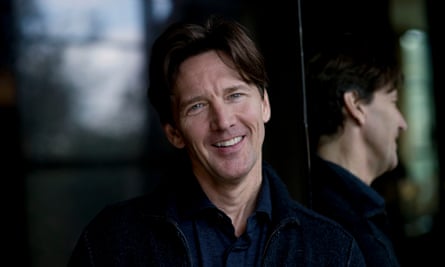
Seeking alternative ways north to our deserted island destination in the Quirimbas archipelago, we were terrorised in Nampula by a gang of youths who threw themselves on our car and refused to move until they were paid. Later, as we raced through a police checkpoint – having been forewarned it was merely another extortion ploy – we feared being shot in the back.
We tried another flight. It never arrived. In the end, we didn’t make it to our hideaway beach spot.
And for the past 10 years, whenever I let my wife down, she never fails to remind me, “… and you owe me a honeymoon!”
Olivia Laing, writer and critic
Italy
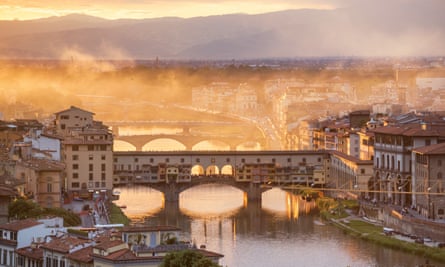
All my best romantic holidays are with friends. There’s too much pressure with a lover; it’s only with a friend you can get truly passionate about a plate of spaghetti.
In 2015, I went on a road trip around Italy with my friend David, a peripatetic playwright from New York who was spending the spring in a castle in Genoa. David always wants to go to the best place: he’s like Tom Ripley crying “Il meglio, il meglio!” at the end of The Talented Mr Ripley. I used to choose very spartan places but he’s given me a taste for luxury.
He chose the restaurants and did all the driving, debonair in aviator sunglasses with a pirate’s moustache. Food was basically all we cared about. We wandered through the ghetto in Bologna and crisscrossed the tumbledown bridges of Florence, window-shopping in the goldsmiths above the green waters of the Arno.
In Parma we became hysterical over a trolley of frighteningly pale veal loin, like human legs. We ate the world’s greatest ragù in All’Osteria Bottega in Bologna. And on our last night we drove through terrifying mountain passes to get to Amerigo dal 1934 in Savigno, a restaurant straight out of a Hemingway novel. We still talk about that truffled egg, a central exhibit in the tender mythology of our friendship.
Olivia Laing’s latest book is The Lonely City (Canongate, £9.99)
Shappi Khorsandi, comedian and author
Rye, East Sussex
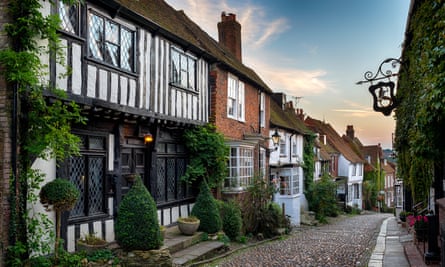
I have been to Rye four times in my life for a romantic mini-break, each time with a different partner. That in itself is perhaps not very romantic and something I perhaps should not have mentioned to the fourth guy. It’s a gorgeous little place and close enough to London, where I live, to make an early exit if it turns out to be an awkward mistake (second guy).
It’s perfect if you’re as into the “olden days” as I am. Mermaid Street is a cobbled beauty and if you go there at dusk in winter, it feels like you’ve stepped back in time. Have a drink at the Mermaid Inn, which dates from the 15th century and has been on TV’s Most Haunted. You’re as likely to see a ghost there as you are the Loch Ness Monster in Tesco, but listening to the stories is fun. A short drive from town are the sand dunes of Camber, which you can run up and down with your lover giggling merrily and falling into each other’s arms. I love going for a mooch around the antique shops then getting some chips. For me, romance should be cosy, cobbled and medieval, and so Rye is perfect.
Shappi Khorsandi is on tour with her show Mistress and Misfit until June. For dates see shappi.co.uk
DBC Pierre, author
Guyana
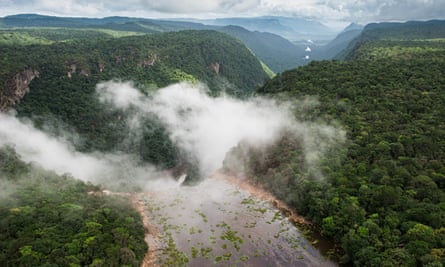
Soft lights and music we have at home, romance surely thrives near the wild. Guyana is brazenly wild, as the girlfriend who once joined me for a “Caribbean” experience agreed within a minute of landing. Just the long, shallow descent into Timehri airport is enough to shift you into one of those movies where dinosaurs appear after your plane crashes. Clouds turn to vapour and the floor is suddenly rainforest, unbroken miles of it, more of it than the area of Britain; so much that it marauds over eight more countries after that one, enough again to fit Britain 30 times. The plane jitters over its gases as if surfing cobbles.
The only symmetry through the window is the Demerara river, gleaming alongside like a handrail. And you can already tell, looking down, that snakes will be there that could eat you whole, spiders the size of your head are at large, and the mud stirs with organisms at least as big as dogs that science has yet to describe.
For romance we should leave them alone. Georgetown’s tartan of canals and colonial wood, with its Indian and Creole food scene, is close enough to carry the voltage. Anywhere with dark rum and ice is close enough.
Then reflect: this is where Indiana Jones got it wrong.
Helen Russell, journalist
Skagen, Denmark
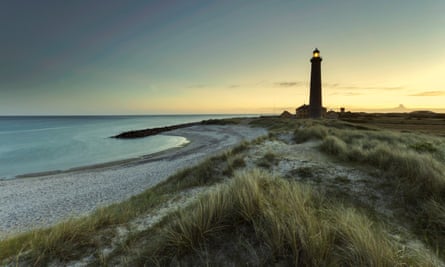
I’d heard about the light – supposedly so extraordinary that it inspired a group of 19th-century impressionists, the Skagen painters (like the Bloomsbury set only Scandinavian, so, you know, cooler and less angsty). I knew Skagen was meant to be romantic, too, and this was to be our last holiday before having a baby. Friends who’d visited had become so loved up, they drank too much rosé and accidentally bought a farm there.
As we drove along a narrow spit to the northernmost tip of Jutland, service stations and farmland were replaced by ochre cottages with red-tiled roofs and sand dunes as far as the eye could see. A bleached, ethereal light made the world and everyone in it look as though they had been Photoshopped, and at Grenen beach – where the Baltic and the North Sea collide – we paddled in the shallows and felt the currents converge.
We ate fish and chips at the Jollehuset on the harbour, treated ourselves to afternoon tea at upmarket Ruth’s , then took a trip to the Buried Church – a 14th-century church regularly submerged by sand from nearby dunes. Until the late 18th century, the congregation used to have to dig out the entrance every Sunday; today, only the tower is visible. We saw the Skagen painters’ works first hand at Skagens Museum, becoming transfixed by PS Krøyer’s paintings of the “blue hour” – the time the sky merges with the sea each evening – and Laurits Tuxen’s stirring sunsets, before heading back outside to witness our own. And we fell in love, all over again.
Helen Russell’s book, The Year of Living Danishly (Icon Books, £8.99), is out now. Her debut novel, Gone Viking, will be published by Ebury on 19 April
Rupert Thomson, novelist
Morocco
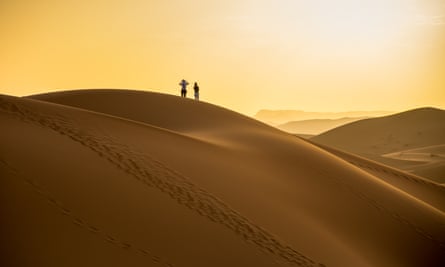
We drove south-east from Marrakech, over the Atlas mountains. We kept going until the road gave out. Scattered in the desert near the oasis of M’Hamid were the most beautiful stones I have ever seen. The size of clenched fists, they had been blasted smooth and polished by the elements. Some were the dull brown of old leather. Others were dark green.
That night, we stopped at a small hotel in a place called Tinfou. We arrived after sunset, and the wind was blowing hard. There was nothing for miles around. We drank glasses of fresh mint tea in a bare room, candles flickering. Our shadows leapt against the pinkish-brown mud walls. In the corner was a man in dark-blue robes. A Tuareg. I spoke to him in French, trying to find out about his life out on the dunes. He was evasive. Is it easy to ride on a camel, I asked. He gave me a steady look. Easier than an aeroplane, he said. We both smiled.
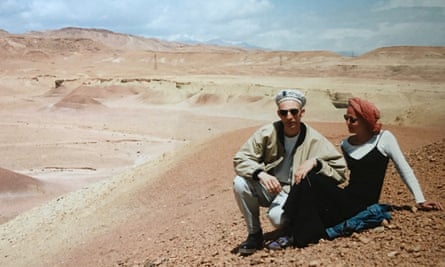
Not long afterwards, my girlfriend and I went to bed. We lay beneath warm blankets. The thin howling of the wind, the prickle of stars in the dark heavens. There is something about being in the desert. I felt far away from everything, and also keenly alive. It was cold outside, but in the morning the sun blazed down once again, and the sky was a flawless blue.
Rupert Thomson’s new novel, Never Anyone But You (Corsair, £8.99) is out on 5 June
Kelly MacLean, comedian
Fogo island, Canada
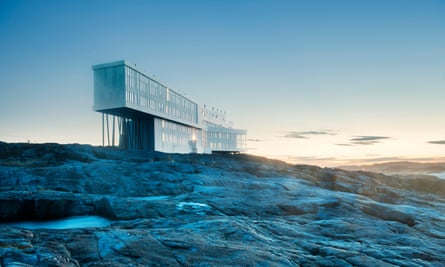
The most romantic trip I’ve experienced was a long weekend on the magical island of Fogo – alone. As the sun broke pink over the horizon one winter morning, I ferried the frosted ocean from Newfoundland’s coast to what the Flat Earth Society believes is “One of the Four Corners of the World”.
The small island was seemingly completely frozen – in frost, yes, and time itself. Each day, I woke to giant windows framing blue sky over snowy sea, warmed by hand-knitted quilts, crackling pine logs and exquisite coffee. I ice-fished with locals, stalked a herd of caribou whose stampede shook me to the marrow, and ate homemade pond-water moose stew without concern about remaining ladylike.
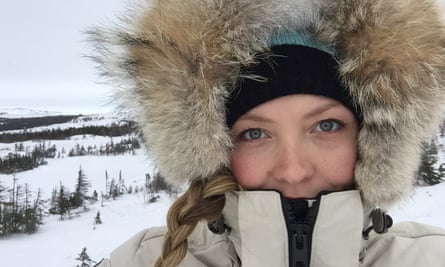
I overspent. I overslept. I overate. I drank ambrosial cocktails made with local gin and – wait for it – hand-chiselled iceberg ice at the iconic Fogo Island Inn (an exquisite but expensive place to stay; there are plenty of cheaper places). I stayed out until sunrise on St Paddy’s Day trading shots of cheap whiskey and singing ballads with the Irish descendants of the village of Tilting. Woo Fogo in the dead of winter with a lonesome heart and she’ll love you right back.
Kelly Maclean’s podcast The Tao of Comedy is available on iTunes
Lois Pryce, adventurer and travel writer
Marseille

Our motorcycling honeymoon through Europe began in Catalonia and we were soon crossing the Pyrenees into southern France, heading towards Marseille and a ferry to Corsica. The French were quick to warn us about Marseille – a rough seaport with a reputation for violent crime, apparently. The night before our approach we wild-camped on a headland near Pointe de le Corbière to the west of town, among gorse and pines with a million-euro view of the Med. But we had little idea of what awaited us along the corniche the next morning.
Maybe it was my Bristolian roots, but as we entered Marseille, I felt immediately at home in this ancient port with its steep, twisty streets and graffiti’d alleyways, drawn to the clamour and promise of the harbour with its ships bound for Algiers and Tunis.
We needed some essentials for our bikes, and found a little motorcycle workshop down a backstreet, incongruous among a jumble of North African greengrocers. The young mechanic welcomed us with Gallic charm and, upon discovering we were on our lune de miel, insisted on giving us a wedding gift of a set of inner tubes. Thrusting them into our hands, he taught us the impossibly romantic French word for this down-to-earth item, chambre à air. A few weeks later, a concierge in a five-star hotel in Prague responded in much the same way with a bottle of champagne, but for me, the inner tubes of Marseille will always remain an icon of romance.
Lois Pryce’s book Revolutionary Ride – On the Road in Search of the Real Iran is out now (Nicholas Brealey, £14.99)
Zoe Williams, journalist
Isle of Wight
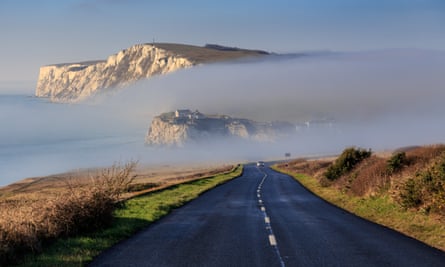
Normally the mini-breaks start a while after you’ve fallen in love, in the “well that was nice, now what shall we do?” phase of a relationship, but for reasons that I won’t describe, it wasn’t like that on the Isle of Wight. I went in the grip of a passion so intense that being apart felt like drowning, and even in winter everything shone so brightly you had to look away – though that is also because of the microclimate.
It’s five degrees hotter than the rest of the country, you’ll learn from the signs in the Ventnor Botanical Gardens, epic, raked, exotic beds, verdant with the bones of the TB victims for whom it was originally built (scratch that, no one’s actually buried under there, but it has a a Victorian, convalescent feel).
The island is full of austere, Hardyesque churches – with final-sounding names like New Church, where you imagine beautiful and tragic events – and fire-dappled pubs where they’ll trick you into drinking local brews that science hasn’t yet brought below 10%. In summer it’s almost too pretty, but the cold gave it gravitas.
The geography is wild: coast on one side and sharp hills like stalks of broccoli on the other. Something in its obdurate difference – not England, not anything other than England – made it unspeakably poignant, a place that doesn’t change the backdrop to a love that doesn’t. God! The romance.
James Reeves, Guardian blind dater
Staffordshire
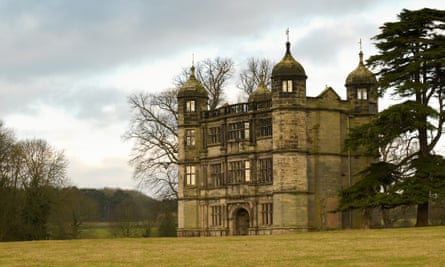
After we married in Scotland, in July 2014 (three-and-a-half years after we met through the Guardian’s Blind Date column), Olivia and I went on honeymoon in Staffordshire. When we spotted Tixall Gatehouse, the Landmark Trust property we were staying in, among the trees, it was like that scene in Brideshead Revisted when the house first appears – just amazing! It’s a four-storey Elizabethan gatehouse that was once part of a bigger estate, but now stands alone in a field. The Landmark Trust restores incredible historic buildings and everything was in period style.
We were like kids on Christmas morning, excitedly running around and checking out the place. On the huge open-plan second floor there was a ping pong table, which was a bit surreal. We spent hours playing – which may not sound romantic but somehow was. There was a table and chairs up on the roof and we’d have our breakfast up there, soaking up the 360-degree views. We explored the area on foot, walking along the edge of the nearby canal. It was restorative, as well as romantic, and a place I won’t forget.
landmarktrust.org.uk, four nights from £479
Jessica Knappett, writer and actor
Thailand

It was meant to be the most romantic holiday of our life – but the best way to sum up our “luxury” honeymoon in Thailand is with a description of the first few minutes of our arrival. The adventure begins when our driver collects us from Phuket airport and falls asleep at the wheel. Twice. A slight hitch, we optimistically assume, as we arrive at the hotel clinging to each other and trying to steady our breathing. It is the stroke of midnight on New Year’s Eve and the fireworks dance in our eyes as we kiss out of relief to be alive.
“NO FOOD FOR YOU”. Booms the hotel receptionist. “RESTAURANT CLOSED. NO FOOD FOR YOU.”
“Hi, we’d like to check in?” My new husband responds politely. We are bundled into a golf cart.“We’re quite hungry. Could we maybe order something to our room?” I place a hand on my husband’s knee.
“KITCHEN,” the man barks, violently turning the buggy around and driving at speed, presumably to the kitchen. He parks and darts inside. There is shouting and the clashing of pans. “KITCHEN CLOSED. FRUIT IN ROOM.” We are escorted to our room to discover a stray dog barking outside our door. We grip each other’s hand tightly and smile.
Inside the room, devouring our unripe bananas, we notice that the hotel guide book is open on the local excursions page. The first suggestion? A local dentist offering teeth whitening. We nearly die for a second time that night but this time it’s of laughter. Not in any way the romantic trip I’d envisaged, but it was certainly memorable.
Drifters, created by and starring Jessica Knappet, is available on all4.com
Inspired to book a romantic getaway? To find discount codes for easyJet, Thomas Cook and other leading travel providers, visit discountcode.theguardian.com
